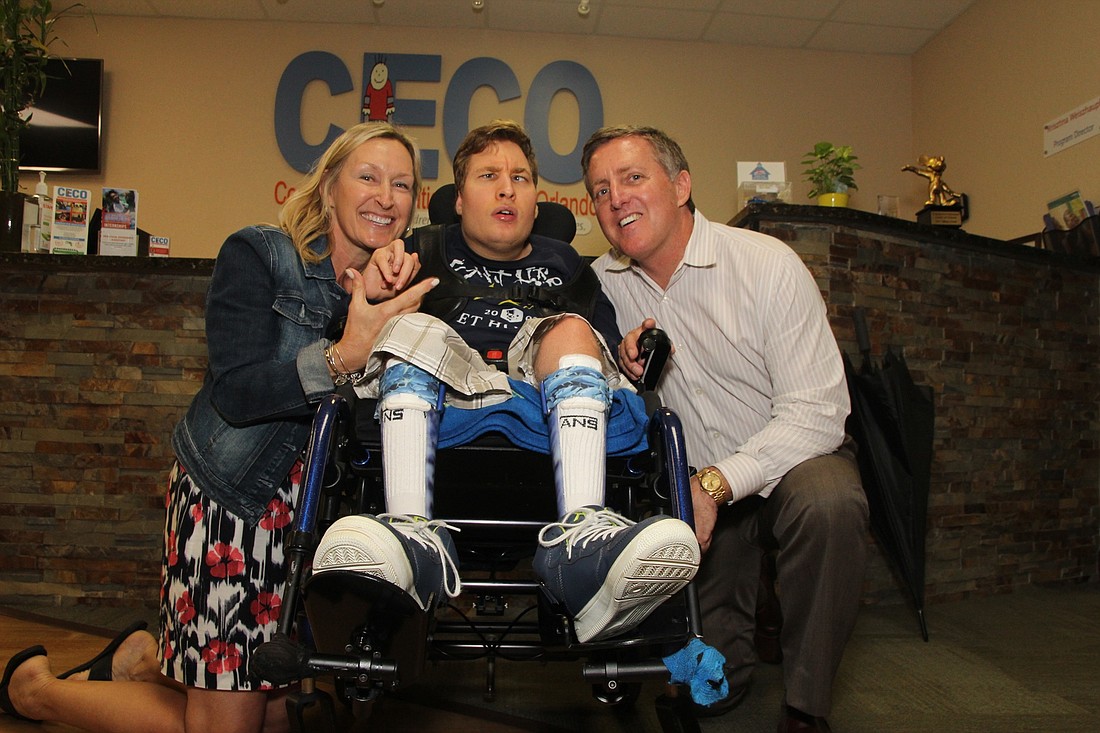- April 3, 2025
-
-
Loading

Nadia Dobkins knew her son, Ian, would have cerebral palsy the day he was born.
She knew her son had a brain injury at birth and would face physical challenges others wouldn’t. She also knew he would spend much of his life in a wheelchair.
What she didn’t know, however, was that one day she would see her 12-year-son walking with a cane to meet her on his own two feet.
“He had never stood up and put one foot in front of the other,” Dobkins said. “I never, ever, ever imagined it in my life. Now he’s been walking — sometimes without a cane — which I can’t put into words.”
She credits Ian’s physical progression to the Conductive Education Center of Orlando, an education nonprofit in the Winter Park area that teaches children with physical disabilities. She said Ian’s been with the nonprofit for a handful of years and in that time has become more physically capable and sociable. Dobkins said CECO has helped him walk with a cane after he received extensive leg muscle and hamstring surgery July last year.
Ian is just one of many students the school has helped in the past 18 years.
Range of Motion
Winter Parkers Vicky and Joe Raymond founded the nonprofit, which has had several locations in Winter Park and Orlando over the years, nearly 20 years ago to help their son, Joseph, who has cerebral palsy, and other families like themselves.
“When you get out of the hospital … the biggest thing we found was a lack of anybody telling us what to expect,” Joe Raymond said. “Nothing about services or anything or what to do. We went home, and it was, ‘Here we are with a special-needs child’.”
The couple found a conductor — a special-needs instructor — to oversee a six-child summer program at Saints Peter and Paul Catholic Church.
The organization has expanded since then. CECO now hosts 36 children with physical disabilities who are watched by six conductors, each with an assistant. There is also a large number of volunteers and interns who helps CECO throughout the year.
The nonprofit’s education curriculum is the same as other schools — math, reading, science, etc. — along with individual plans for each student that focus on physical, cognitive and social development. CECO also has a focus on training the children to do physical activities they may have trouble with doing. Those activities include stretching and lifting their arms in certain ways to make it easier putting on T-shirts, folding clothes and more critical functions such as using a bathroom by themselves. They also have daily exercise routines to promote independent movement and to combat atrophy.
The Raymonds are particularly proud of the emotional benefits they believe their group provides. In the program’s 18 years, there only has been one family with a special-needs child that has divorced, and Joe Raymond believes it is because the program gives parents the ability to work and take care of their other children and responsibilities while their special-needs child is at school.
“Our son has gone through 25 brain surgeries; he’s gone through a lot, and our two daughters went through a lot taking care of him,” Vicky Raymond said. “But that’s why we created CECO. We needed family balance … every single family life here is better because they have balance.”
The nonprofit also has a number of scholarships for students and families available to help with tuition, according to Executive Director Marni Stahlman. The children are given an assessment test to see if they’re suitable for the group.
The nonprofit has added adult-learning programs for students who grow out of high-school level learning. It is also planning a pilot conductive education program for adults with Parkinson’s disease.
INFORMATION: Conductive Education Center of Orlando
931 S. Semoran Blvd., Suite 220, Winter Park
HOURS: 8 a.m. to 5 p.m. Mondays through Fridays
PHONE: (407) 671-4687
WEBSITE: ceco.org